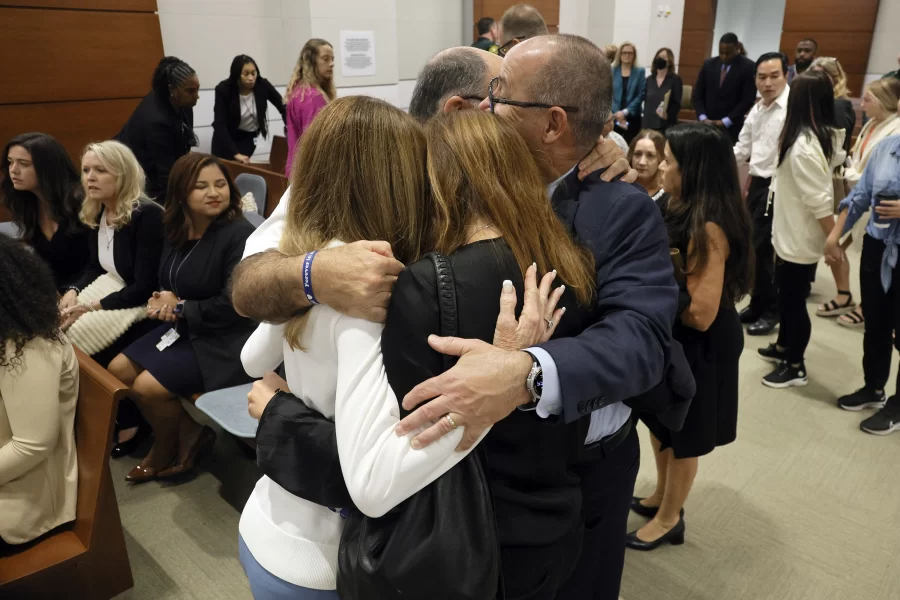Opinion | Death penalty is not justice for Parkland victims
Photo courtesy of Amy Beth Bennett/TNS
Linda Beigel Schulman, Michael Schulman, Patricia Padauy Oliver and Fred Guttenberg, all family members of the victims killed by the Parkland shooter, in the courtroom to hear the verdict in the sentencing trial on Oct. 14.
Oct 28, 2022
On Feb. 14, 2018, the nation was shaken to its core. One of the most devastating school shootings in the United States occurred in Parkland, Fla,. at Marjory Stoneman Douglas High School. About half of the victims were freshmen attending school.
As a high school freshman at the time, this was terrifying and traumatic to me and my classmates. These kids were just like us. Students at my school later held a memorial service to honor the victims of the tragedy.
On Oct. 13, 2022 — four years later — the man responsible for 17 deaths faced a jury who had decided his fate. Nikolas Cruz was tried for capital punishment, and the judges decided that he would instead serve life in prison.
The death penalty has long been a controversial topic. Currently in the U.S., capital punishment is legal in 27 of the 50 states. Whether or not it should be allowed continues to be a topic of debate. Even though Cruz unforgivably took the lives of 17 people, the U.S. government should not do the same to him — the death penalty is inhumane and unethical.
Historically, the death penalty has been used in crimes where at least one victim is killed. In total, there have been 1,551 executions since the 1970s. All of these criminals, convicted for killing, face the same fate as their victims.
Get The Daily Illini in your inbox!
Arguments for the death penalty claim it serves justice, but it violates human rights. The Eighth Amendment to the United States Constitution states that no cruel or unusual punishments shall be inflicted. Additionally, the 14th Amendment guarantees due process and equal protection.
The death penalty violates both of these laws in that it allows killing a criminal against their own will — not to mention the fact that some sentenced to death are wrongly convicted. Almost 200 prisoners on death row have been exonerated because they were wrongfully convicted. More than half of these wrongfully convicted prisoners are Black.
Minority groups experience discrimination in the criminal justice system. People who are poor are more likely to receive a death penalty sentence compared to wealthy murderers. People with disabilities also face high rates of incarceration and police violence. These inequities violate the equal protection clause of the 14th Amendment because certain groups disproportionately face incarceration and the death penalty.
Nikolas Cruz has been in prison since 2018 and pled guilty to the Parkland massacre in October of 2021. One year later, the jury finally met to decide if capital punishment should be implemented.
However, the trying of Cruz for the death penalty was harmful to the victims’ families. Having to address the deaths of their children or family members four years after their deaths cannot be easy. Sitting through a long and tiresome trial and being bombarded with reporters definitely isn’t enjoyable for grieving families.
Some argue that seeing the death of the perpetrator brings closure, but this is a myth. The stress, pain and reliving of traumatic memories families experience from a death penalty trial do not come to an end when the murderer’s life does.
Seeing live executions being broadcasted can be triggering for some, and it adds to public desensitization. When we see these killings, it becomes a normal occurrence. This can cause people to be less empathetic toward each other and less averse to inhumane treatment.
We need to look at other issues to solve these problems, like common sense gun control. Cruz was able to acquire a firearm that allowed him to engage in the act of a shooting. Creating stricter regulations on who is able to acquire and own guns is crucial in stopping future school shootings and keeping children safe.
Instead of spending about $700,000 on each death penalty case, the government can use that money to prevent future devastations. Putting more funds toward helping the victims of gun violence and awareness programs can mitigate the effects of gun violence.
Killing someone who has committed crimes does not stop future crimes from happening. Killing Cruz would not bring back the lives he took in 2018. The only thing that can prevent future mass shootings is government action against the weapons that cause them.
Maggie is a sophomore in Media.






